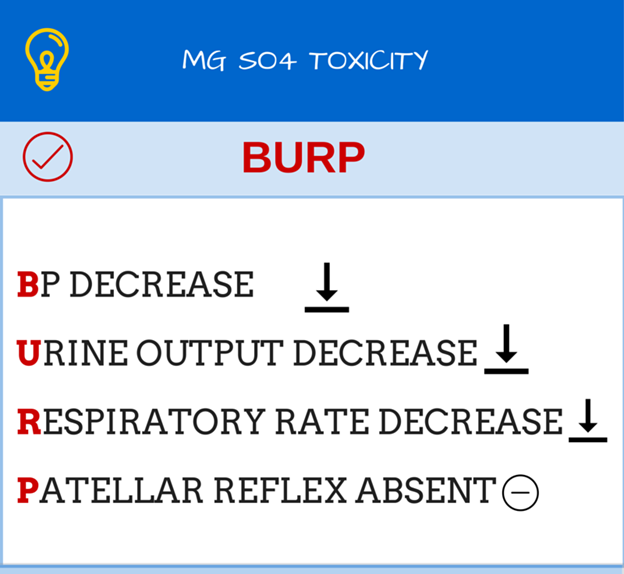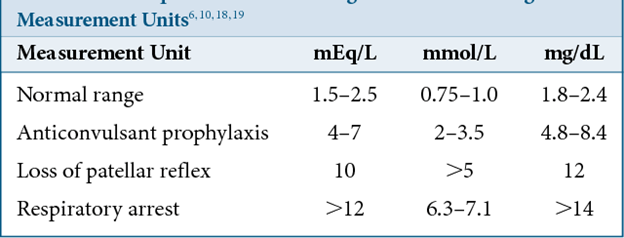A nurse is caring for a client with severe pre-eclampsia who is receiving magnesium sulfate.
Which of the following findings would indicate magnesium toxicity and require immediate intervention?
Urinary output of 25 mL/hour
Respiratory rate of 14 breaths/minute
Deep tendon reflexes 1+
Serum magnesium level of 6 mg/dL
The Correct Answer is A
A. Urinary output of 25 mL/hour. This indicates magnesium toxicity and requires immediate intervention because it means the kidneys are not functioning properly and magnesium is not being excreted. Magnesium toxicity can cause life-threatening complications such as respiratory depression, cardiac arrest, and coma.
B. Respiratory rate of 14 breaths/minute is normal and does not indicate magnesium toxicity. A respiratory rate of less than 12 breaths/minute or more than 20 breaths/minute would be abnormal and require further assessment.
C. Deep tendon reflexes 1+ are normal and do not indicate magnesium toxicity. A loss of deep tendon reflexes or clonus would indicate magnesium toxicity and require immediate intervention.
D. Serum magnesium level of 6 mg/dL is within the therapeutic range for preeclampsia and does not indicate magnesium toxicity.
The therapeutic range for preeclampsia is 4 to 7 mg/dL. A serum magnesium level of more than 8 mg/dL would indicate magnesium toxicity and require immediate intervention.

Nursing Test Bank
Naxlex Comprehensive Predictor Exams
Related Questions
Correct Answer is A
Explanation
This indicates a therapeutic level of magnesium sulfate for a client with severe pre-eclampsia who is receiving magnesium sulfate.According to some sources, the effective therapeutic serum magnesium level is 1.8–3.0 mmol/L, which corresponds to 4.2–7 mg/dL or 3.5–7 mEq/L.

Choice B is wrong because serum calcium level of 8.5 mg/dL is within the normal range and does not indicate the effect of magnesium sulfate.
Choice C is wrong because serum creatinine level of 1.2 mg/dL is within the normal range and does not indicate the effect of magnesium sulfate.
Choice D is wrong because serum potassium level of 3.5 mEq/L is at the lower end of the normal range and does not indicate the effect of magnesium sulfate.
Correct Answer is C
Explanation
The client should not resume normal activities as soon as she gets home because she is still at risk for complications from preeclampsia.She should rest as directed by her healthcare provider and avoid strenuous activities that may increase her blood pressure.
Choice A is wrong because monitoring blood pressure at home is a recommended practice for clients who had preeclampsia.It can help detect any signs of worsening hypertension or organ damage.
Choice B is wrong because reporting any headache, vision changes, or abdominal pain to the doctor is a crucial step to prevent serious complications from preeclampsia.These symptoms may indicate damage to the brain, eyes, or liver and require immediate medical attention.
Choice D is wrong because continuing to take prenatal vitamins and iron supplements is beneficial for the client’s recovery and health.Prenatal vitamins can provide essential nutrients that may be lacking in the diet, and iron supplements can prevent or treat anemia that may result from blood loss during delivery.
Whether you are a student looking to ace your exams or a practicing nurse seeking to enhance your expertise , our nursing education contents will empower you with the confidence and competence to make a difference in the lives of patients and become a respected leader in the healthcare field.
Visit Naxlex, invest in your future and unlock endless possibilities with our unparalleled nursing education contents today
Report Wrong Answer on the Current Question
Do you disagree with the answer? If yes, what is your expected answer? Explain.
Kindly be descriptive with the issue you are facing.
